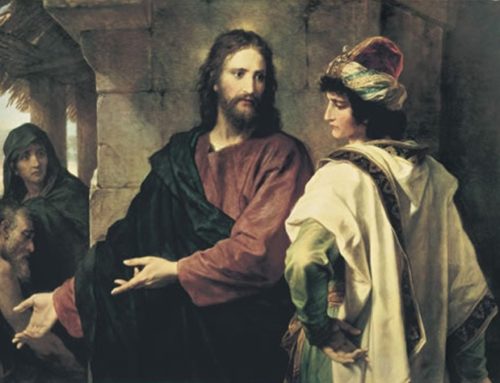The calling of the First Apostles
Jesus had left John, Andrew, James, Simon, Philip and Nathaniel with a restless heart. Now, they believe, but their lives went on the same as before. Their faith was like a seed that still had to grow. They knew they had to do something, but they didn’t know what.
A SPECIAL PLACE: THE LAKE OF GENNESARET
Jesus arrives while they were working. He seeks them near the lake of Gennesaret. It mesaures about twenty by ten kilometers. Its fresh water comes from the high peaks of Mount Hermon which then spills into the Jordan River.
Trees and meadows surround the lake. During spring, little flowers color these meadows. The weather is very pleasant, given that it is situated not too near the Mediterranean coast and that cool winds descend from the surrounding mountains. The fishing ports in this lake are close to one another, for the lake teems with abundant fishes.
Due to its location, it is a place where the villagers can live comfortably, free from the hostility of an excessively hot or cold weather.
The locale lends itself to prolonged outdoor friendly conversations; and since it rains very little, outdoor gatherings while seated on grass fields are frequent.
At some distance from the lake, small hills can be found, from which a good view of the whole lake can be easily enjoyed. The view is even better at sunset, which can inspire one to pray and togive thanks to God for the beauty of Creation.
Nazareth is quite close to the Lake of Gennesaret but is separated largely by the following villages:Bethsaida – the place of birth of Peter, John, Philip, Andrew and James – ; Capernaum – where Peter and Andrew were staying when they received the call of Jesus – ; Magdala – where Jesus met the repentant sinner Mary- ; Tabgha – where the second miraculous catch took place, that of some 153 fishes – ; Tiberias – the roman district of bad reputation among the Jews – , and small fishing ports.
This is the background of the second encounter of Jesus with some of his would-be Apostles. The seed that was sown in their hearts during their first encounter with the Lord now bears its first fruits.
AFTER THE FIRST ENCOUNTER
The first six, after talking with Jesus, went home with restless hearts. They couldn’t be indifferent with what they had seen and heard. The encounter with Jesus was intense; Jesus had entered into their lives profoundly.
It is remarkable how that they left everyting and followed him perhaps because they encountered quite a few obstacles and that they were men of good will. However, it is good to point out that it was not that easy to get used to the uncertain and the unknown: it was an encounter with the Messiah announced by the prophets and expected by the Israelites for many centuries. Jesus said to them that he was the Messiah that they were waiting for: the Lamb of God that takes away the sins of the world.
The impact of the first encounter and the depth with which Jesus uttered his first words moved them interiorly. The seed that the sower threw fell on the rich soil of their souls.
Jesus gave them time to assimilate what they had heard and seen. After, he sought them once again to make a second calling, the final one. The calling was sudden and the response was prompt. The promptness suggests that they have reflected on their first encounter.
After the miracles in Judea and Nazareth, the souls were already ripe and Jesus appeared to them in Capernaum. At the sight of Jesus, the six felt a great interior restlessness.
It was a moment of immense joy although to some, it presented a sort of uncertainity considering that that momentous occasion would complicate their lives.
They received him warmly and Jesus stayed with them –his new friends– delightfully. Jesus knew what were in their hearts and minds. He told them things that they both unexpected and yearned for. For example, “Follow me”. The Lord wanted to make clear that they did not choose Him as their Teacher, rather it was He who freely chose them as disciples.
He called them as He passed by. It appeared informal and prompt; like something said in passing but it was not like that. Christ sought them. He deliberately visited their village and went straight to the lakeshore where they were fishing. It was the moment he chose to enter into their lives.
As he passed by the Sea of Galilee, he saw Simon and his brother Andrew casting their nets into the sea; they were fishermen. Jesus said to them, “Come after me, and I will make you fishers of men.” Then they abandoned their nets and followed him. He walked along a little farther and saw James, the son of Zebedee, and his brother John. They too were in a boat mending their nets. Then he called them. So they left their father Zebedee in the boat along with the hired men and followed him. (Mt and Mk)
WHAT DOES THE CALLING MEAN?
What does “follow me” mean? Is it a command or a request? These questions are not easy to answer because the Bible does not tell how Jesus pronounced those words. Vocation is a combination of both a command and a request. The Will of God is made manifest with those words, therefore it is a command; but at the same time, the calling demands a free response, therefore it is also a petition. It is a command but with an affectionate tone.
It is like saying: “If you want, you can be my disciple, but keep in mind that it is God who is asking it from you” or “I wish that you follow me, although you are totally free to decide”. Indeed, love is more demanding than justice and when it is Love who calls, the petition is a command.
What are the demands of following Jesus? We see clearly in the response of the apostles: to abandon their activities, to change their way of life, and to live like Jesus. He was asking them a conversion, to make God the center of their lives and at the same time, to dedicate themselves to an enigmatic mission.
It was logical to ask questions to know well what they ought to do; how they would leave their families, boats, and a thousand important details. But they did not ask questions. They believed in Jesus, they trusted in Him and so they followed him leaving everything. Andrew and Peter abandoned their nets just like that. James and John left their father dumbfounded.
They left everything “immediately and at that precise moment”. Neither there was any delay nor were there excuses. In the case of the four apostles, it was not a case of imprudence or recklessness because they knew well who Jesus was and they believed in Him. They had the basic formation that the Mosaic Law provided them, combined with the preaching of John the Baptist.
If it were a generous but imprudent response , Jesus could not have admitted them to his company. It is not to say that their response was perfect or that they perfectly knew the demands of the calling. Jesus called them in order to form them. Jesus knew very well their intellectual and human limitations.
But the courage, the firmness, and the promptness in the decision is necessary so that it be a generous act. To follow Jesus is to share his life. The panorama is encouraging but not easy. Jesus is demanding; he will be acquainted with them closely and continuously.
Jesus’s dealing with each one of them on a daily basis makes him notice the defects of the other: discouragement, bad humour, laziness, critical spirit, envy and many more. But only through this friendship is possible an elaborate and integral education and formation.
Great ideals and good counsel are applied to real life through corrections and detailed customs, for example, saying only good things about other people, patience amidst the unexpected contradictions, being prompt in the mental prayer, among other acts.
James and John left their father Zebedee and Peter his family. It is not always about leaving behind something evil or unimportant but rather sometimes, good ones such as family. Although the fourth commandment is important, the first commandment is more important. The fourth commandment cannot be against the first commandment nor can it be an excuse to not give oneself.
The demand of the calling of Jesus to his disciples can be summarized in “commiting oneself”. At the beginning, Jesus did not tell them everything that they had to do. Neither did he tell them that they would live a celibate life, nor to live as if they were not married, nor to live a particular way of life. Had Jesus spoken at the start about the Cross, they would have been taken aback or perhaps they would not have dared to respond to the calling. It appears clear that to follow Him is equivalent to trust in Jesus and act in the way that the Master indicates.
Enrique Cases





Leave A Comment
You must be logged in to post a comment.